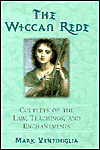
I read this book already irritated by its author (see my review for The Wiccan Prayer Book) who (according to his biography) “. . .has intensively studied most of the world’s major religious traditions, as well as many pagan and shamanistic traditions. He was ordained by the Universal Life Church in 1995, earned his Ph.D. in religious philosophy in 1996 and since 1997 has given lectures and workshops on the Wiccan religion and alternative spirituality”. Google isn’t everything, but many groups list their lectures and speakers on it, and Mr. Ventimiglia didn’t come up anywhere. I did find a WitchVox profile for what looks like his group, The Coven of the Green Earth (http://www.witchvox.com/vn/vn_detail/dt_gr.html?a=usil&id=26920, posted 12/5/2005) “Locally forming in the hills of Godfrey IL, we are forming a circle of straight, heterosexual practitioners of the Craft. All members green or heavily experienced may look further in for details.”
Why am I telling you all of this? Because these presumably are his credentials for writing “a complete philosophical learning system that is easily translated into daily life (from the back cover).” In the Preface he tells us “There has never been a book written or published solely concentrating on its deep and meaningful teachings . . . “ Apparently, the Rede is not just an ethical guideline, but a complete learning system.
Um. No.
I’m not a Gardnerian, although part of my training was based on that system, but I know that Wicca does not base its teachings on the Rede*. For one thing, the Rede was written nearly 20 years after Gardner began to go public. And Wicca did not exist prior to Gardner. (Witchcraft most assuredly did, as did many forms of pagan worship. But Wicca is the child of Gardner.)
No for some specific points:
- Wicca and witches are not interchangeable.
- Witchcraft has roots within a shamanistic magickal framework, but branches frantically out for there to encompass everything from ceremonial magic and kitchen witchery.
- Monotheism did in fact have a champion with Akenaten (who he calls Amenhotep) about 100 years before Moses lived. However, it did not survive the pharaoh’s death, whereas it did survive (and flourish) after Moses died.
- Yes, the specific origins of the entire Rede are unknown, much history has been authenticated.
Deosil go by the waxing moon,
sing and dance the Wiccan rune
but in Ventimiglia’s version it becomes:
Deosil go by waxing moon,
Chanting out the Seax-Wiccan Runes
In this case, the reader is told “This lesson is perhaps the most complex of all the Wiccan Rede’s teachings, for within it are contained the secrets of the directions and activities of celestial bodies, runology and curses.” Ummmm . . . No.
This book is one man’s version of how to live a faithful life, and it reflects one man’s foibles. For example, to be an _intelligent_ Wiccan, I must be a vegetarian who chews her food slowly and only eats three meals a day (chapter two, in accordance with the second couplet “Live ye must and let to live, fairly take and fairly give”). In his view, one of Wicca’s primary aims is to end the afflictions of misery, pain, sorrow and old age. (Sorry, not true – at least not that simplistically.)
I guess if you’ve never had a teacher, or a group of people to debate ethics and morality with in a spiritual setting, you might find The Wiccan Rede of use as a way to think about some of the underpinnings of Wicca. But for my money, I think Judy Harrow’s “Exegesis on the Wiccan Rede” is much more useful.
Oh, and I know a whole lot of Gardnerians (as in lineaged and can prove it) who don’t use the Rede at all. They follow the Old Laws, or the Charge of The Goddess. Interesting, no?
~review by Lisa Mc Sherry
Author: Mark Ventimiglia
Citadel Press, 2003
pp. 212, $7.95
* For the record, my path is that of American Eclectic Wicca.
